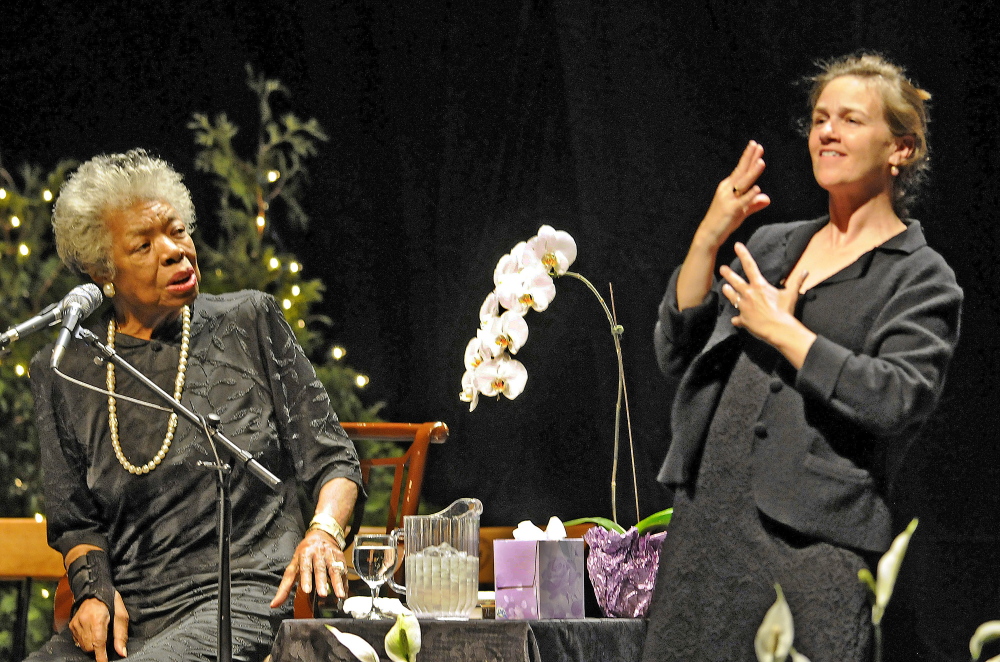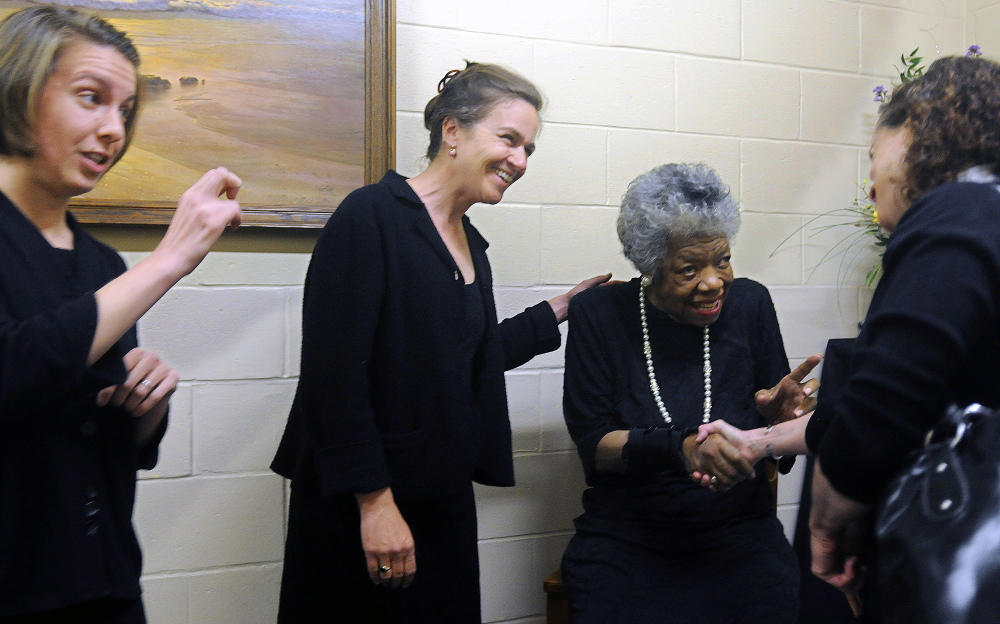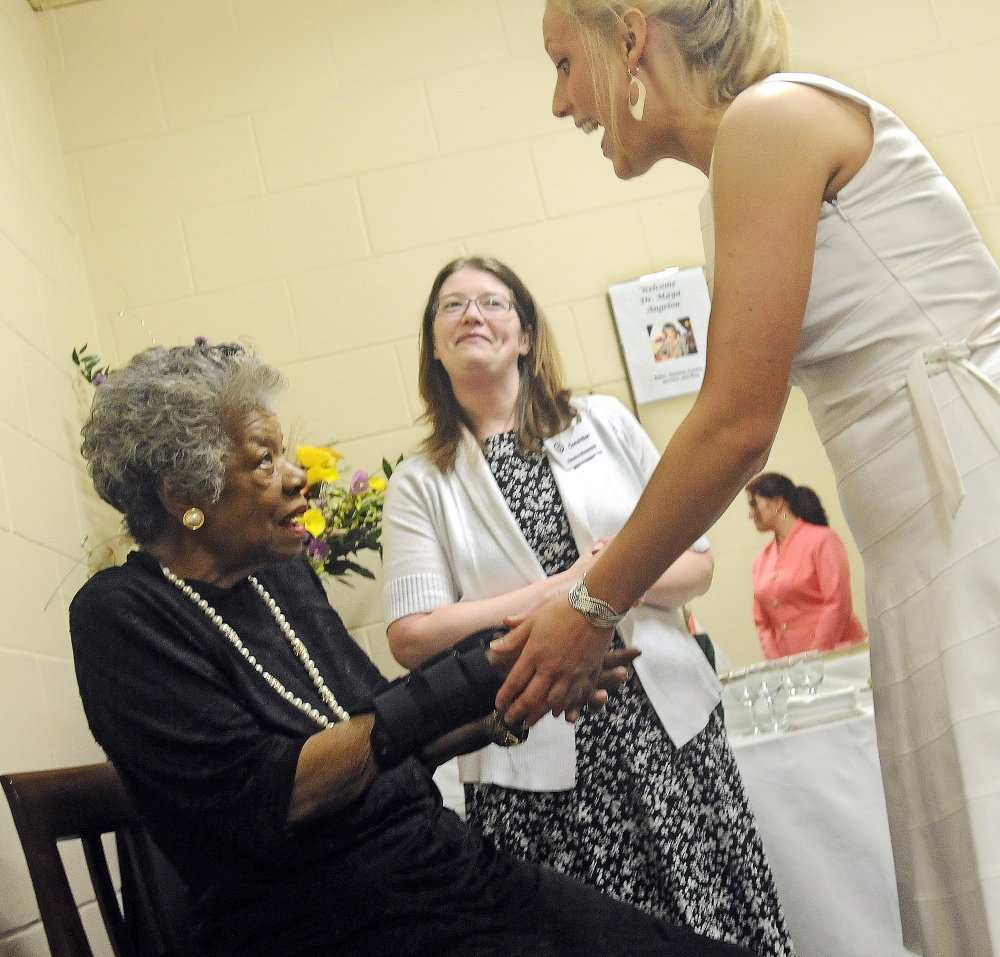AUGUSTA — The Augusta Civic Center was packed to near capacity when Maya Angelou spoke there in 2010.
When the University of Maine at Augusta brought the author and activist to share her stories and poetry in Augusta, nearly 5,000 people attended the event at the civic center.
Yet to UMA English professor Ellen Taylor, the atmosphere felt similar to the time when Taylor previously saw Angelou speak to a much smaller crowd in the late 1980s.
“Each time I was just struck by this extraordinary charisma and passion that she can communicate even to a crowd of thousands of people,” Taylor said Wednesday. “It felt like she was talking directly to you.”
Many of the thousands of people who were at the civic center that day reflected on the experience Wednesday after hearing of Angelou’s death in Winston-Salem, N.C., at the age of 86.
Angelou wrote poems, autobiographies, cookbooks and screenplays. She also was an actor, a singer, a civil rights activist and a professor, probably best known for her first autobiography, “I Know Why the Caged Bird Sings,” published in 1969.
UMA’s student government association organized her well-attended appearance in Augusta, at which students read a handful of Angelou’s poems to the crowd and Mayor Roger Katz presented Angelou with a key to the city.
It was Angelou’s first appearance in Maine in more than 15 years and it was a major event for UMA. American studies professor Sarah Hentges taught a semester-long course about Angelou’s work, and Hentges, Taylor and UMA’s writing center coordinator led three workshops for the public.
Taylor said all three UMA workshops were filled, attended by students, faculty and community members. By working in so many artistic media, Angelou reached a wide audience and created connections across lines of gender, race and class, Taylor said.
“She really walks the walk, with her words and the way she communicates them,” Taylor said. “I think everyone felt really blessed by her even though we were in a huge auditorium.”
During her talk at the civic center, Angelou recounted tales from her childhood, motherhood and her travels, and read an assortment of her poetry, while also urging those in the audience to be of use in life, to refrain from smoking, to use their local libraries and to laugh.
She said she couldn’t turn down the invitation from UMA.
“You’re in this institution for some reason, so you can liberate the world, not just for its benefit,” Angelou said at the time, “but so you can liberate it from your ignorance.”
American Sign Language interpreters Margaret Haberman and Marisa Zastrow had the task of communicating the poems and stories to a large number of deaf people in the audience.
Haberman said it was a challenging and inspiring experience, and Angelou’s staff invited them to meet with her beforehand.
“The thing that was so impressive to me was she was tremendously gracious to meet with us and just touch base with us as people who were going to share the stage with her,” Haberman said. “Not all performers and artists feel that way or are comfortable with that.”
Haberman and Zastrow worked with Brenda Schertz, a native speaker of American Sign Language who teaches at the University of Southern Maine, to translate some of Angelou’s poems in advance of the event.
Schertz, speaking through an interpreter, said it was a wonderful and creative process trying to capture the intent of Angelou’s work and the beauty of her language through the interpreter’s gestures and facial expressions.
Angelou’s poem “Phenomenal Woman” especially moved Schertz, and she was honored to help people access it through American Sign Language.
“I wanted to make sure that that chutzpah and that pride and that intelligence about being a woman and being comfortable with herself could really be expressed, not only in the signs but in the interpreters themselves,” Schertz said.
Paula Bourque, a literacy coach for Augusta Public Schools, went to see Angelou speak because she’s read Angelou’s words for years and wanted to hear them live from her mouth.
Bourque was surprised by how much Angelou made the audience laugh, even while talking about the difficulties of her childhood.
Angelou’s experiences as a black girl growing up in the Jim Crow South set her apart in majority-white Maine, but Bourque said she felt a sisterhood in the audience at the civic center, which consisted largely of women — mothers, grandmothers and children.
“I think people were looking to a connection to her because she’s just such an amazing person,” Bourque said, “and I feel lucky that I had that connection.”
Bourque said she was sad at first when hearing about Angelou’s death but soon realized that people will continue to feel her presence and learn from her through her work for generations. Bourque sent her teacher colleagues a video of Angelou’s poem “Life Doesn’t Frighten Me,” written for children, to use in their classrooms if they want.
“Life was hard for her,” Bourque said, “and yet she was so positive about everything.”
Susan McMillan — 621-5645 | smcmillan@centralmaine.com | Twitter: @s_e_mcmillan@s_e_mcmillan
Send questions/comments to the editors.





Success. Please wait for the page to reload. If the page does not reload within 5 seconds, please refresh the page.
Enter your email and password to access comments.
Hi, to comment on stories you must . This profile is in addition to your subscription and website login.
Already have a commenting profile? .
Invalid username/password.
Please check your email to confirm and complete your registration.
Only subscribers are eligible to post comments. Please subscribe or login first for digital access. Here’s why.
Use the form below to reset your password. When you've submitted your account email, we will send an email with a reset code.